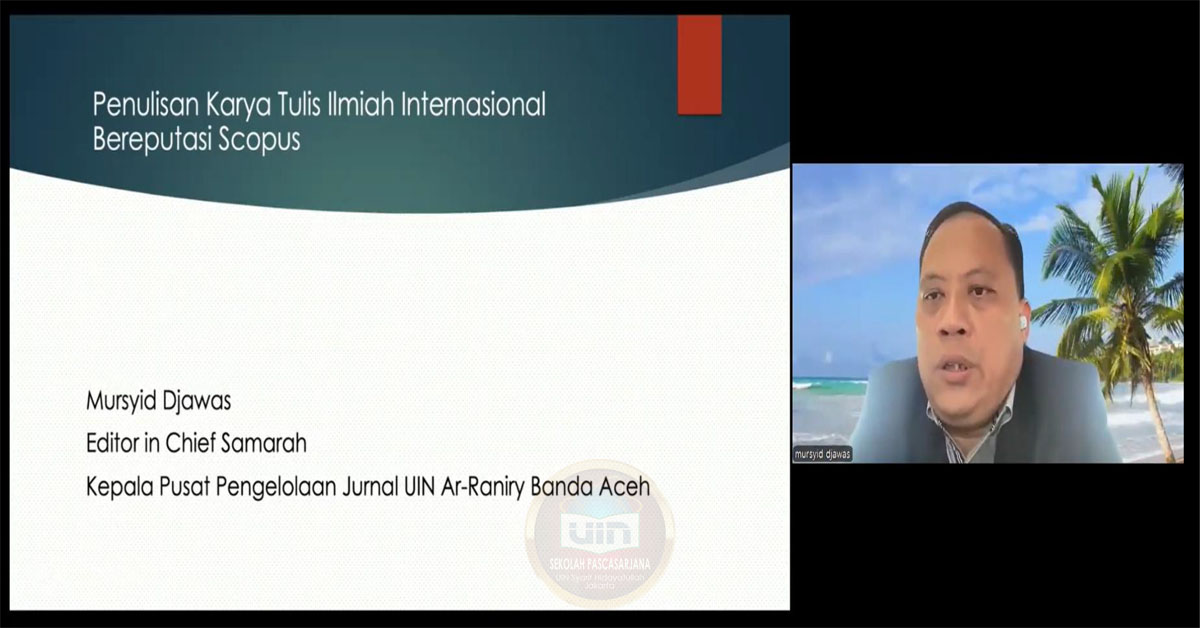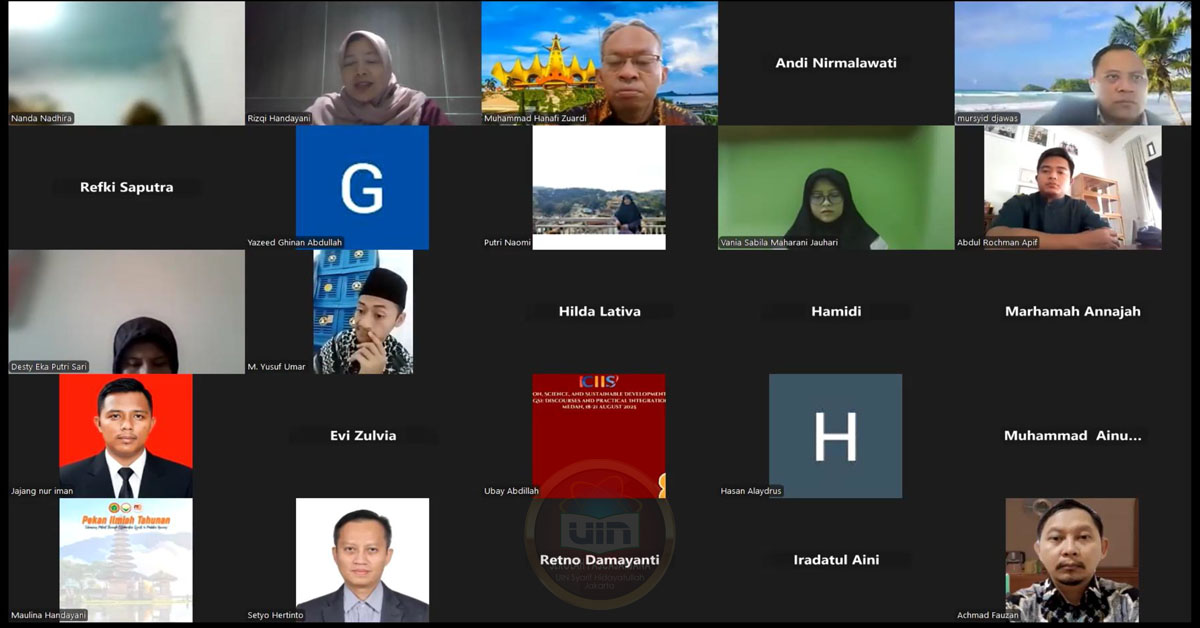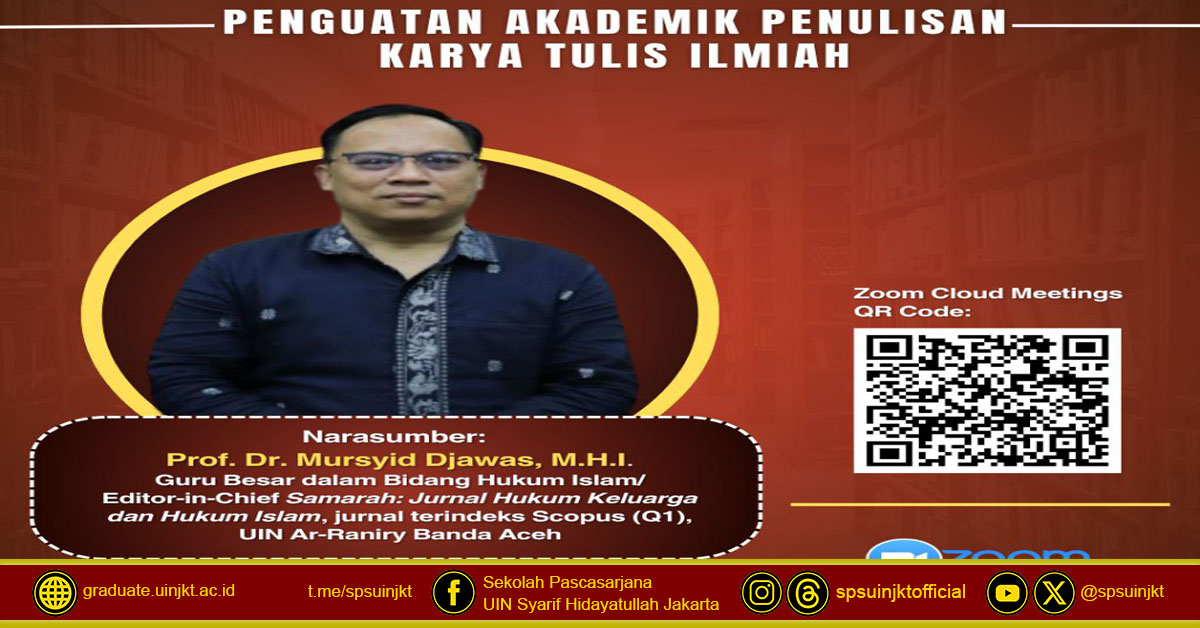Publication Strategy of Reputable International Journals Scopus with Prof. Dr. Mursyid Djawas
SPs UIN Jakarta Building, SPs NEWS - The Graduate School (SPs) of UIN Syarif Hidayatullah Jakarta held an Academic Strengthening event for Scientific Writing with the theme "International Scientific Writing with Scopus Reputation". The event, which was held online on Wednesday, October 8, 2025, is a strategic step for SPs UIN Jakarta in encouraging an increase in student contributions in the global arena.
The main objective of this activity is to improve the ability of students to produce and write articles worthy of publication in reputable international journals Scopus. The need for reputable international publications, especially Scopus, is now a crucial benchmark for the academic progress and contribution of Indonesian research in the world.
This academic strengthening felt special with the presence of a resource person, Prof. Dr. Mursyid Djawas, MHI. He is a Professor of Islamic Law and at the same time the Editor in Chief of Samara: Journal of Family Law and Islamic Law, a journal that has been Indexed by Scopus (Q1), from UIN Ar-Raniry Banda Aceh.
The event was opened and moderated by Dr. Rizqi Handayani, MA, Secretary of the Master of Islamic Studies Study Program. In his remarks, Dr. Rizqi expressed his appreciation and gratitude for the presence of Prof. Mursyid Djawas, in the midst of an extraordinary busyness, to share knowledge and experience.
He also pinned great hope that participating students could take advantage of this momentum to really improve their ability to write articles so that they meet the strict standards of reputable international journals.

In his presentation, Prof. Mursyid emphasized that the Indonesian academic world continues to strive to increase its contribution in the global arena, with publications in reputable international journals, especially Scopus, as the main benchmark. An in-depth understanding of writing systematics, both IMRAD (Introduction, Method, Discussion, Conclusions, Refference) and Non-IMRAD formats, is crucial.
He emphasized that publication at Scopus requires not only original and robust findings, but also adherence to standard writing structures and strict standards. This standard guarantees each article has a scientific weight and a systematic logical flow, making it worthy of competing with the work of world researchers.
The success of an article, according to Prof. Mursyid, is often determined from the first paragraph. Starting from the title which must be short, concise, and clearly describe the main problem being researched.
Furthermore, the Abstract acts as the main gate. The mandatory abstract includes four key elements: a problem statement, a research question, the methods used, and the main findings of the research.
In the Introduction section, the author is required to briefly explain the issue being researched, its significance, and the way the author discusses the issue. In addition, compliance with technical standards is also a determinant of quality, such as the use of reference managers such as Mendeley or Zotero and Arabic-Latin transliterations that correspond to the requirements of the journal.
The Discussion section is highlighted as the heart of the scientific paper. This is where scientific analysis and findings must be presented comprehensively, logically, and systematically. The author is required to clearly explain the results of his research by referring to the relevant Theory, reviewing the data found, and affirming the Author's View which must be supported by strong evidence.
Prof. Mursyid also reminded that every citation must be included in the footnote. The strength of an article's argument depends largely on the quality of the references used.

Therefore, references should be dominated by the main and latest literature, especially those from reputable Scopus journals such as Samarah, Al-Jami'ah, or Studia Islamika, in order to strengthen the scientific position of the manuscript.
In closing, the Conclusions section not only summarizes the findings, but also provides Suggestions or Recommendations for further research. This is an opportunity for the author to provide impact and direction for future studies.
Prof. Mursyid closed his session with good news that spurred enthusiasm. He provided an opportunity for six selected articles from SPs UIN Jakarta students to be published in the Samarah Journal and El Usrah.
By mastering the IMRAD/Non-IMRAD structure, adhering to technical writing rules, and enriching references from reputable sources, Prof. Mursyid believes that students can consistently improve the quantity and quality of publications in the Scopus journal, while strengthening their position in the global research community. This initiative marks SPs UIN Jakarta's commitment to producing internationally competitive academics. (JA)

